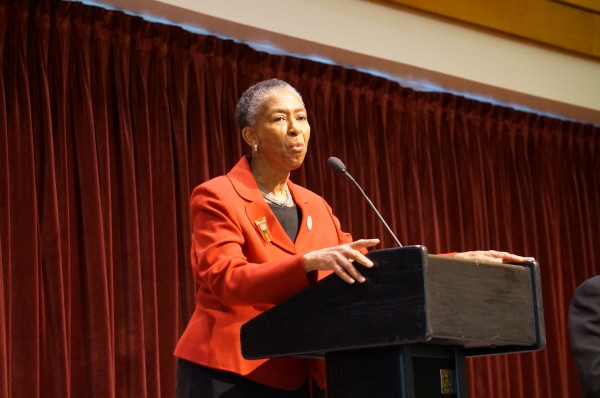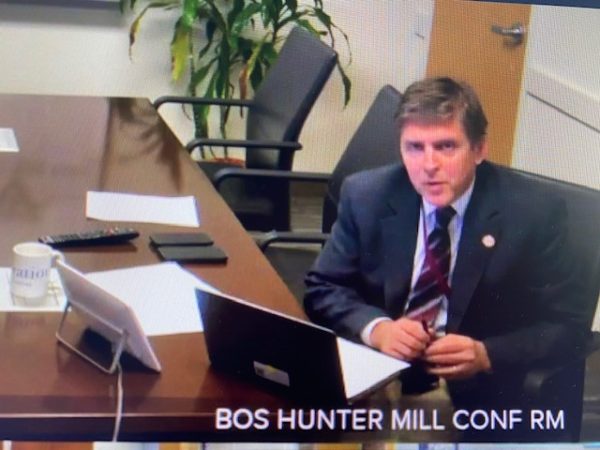Southgate Community Center will be renamed after former Hunter Mill District Supervisor Cathy Hudgins at a formal community day next month.
Hudgins, who represented the Hunter Mill District from 2000 to the end of 2019, solidified the center’s future by recreating it as a county-owned facility in 2006.
The move was pushed forward by Hunter Mill District Supervisor Walter Alcorn, who noted that Hudgins negotiated the land lease with Reston Association, secured funding, and ensured the project was completed.
The community day will take place from 1-5 p.m. Saturday, Oct. 16 at the community center (12125 Pinecrest Road) and featuring games, kids’ activities, food trucks, entertainment, raffles and more.
“Supervisor Hudgins worked tirelessly to negotiate the land lease with the Reston Association, secure the financing, review the building design, monitor its construction, and support the center’s program activities,” Alcorn wrote in a previous board motion.
A former AT&T technical consultant and programmer/analyst, Hudgins became involved in the county government as electoral board secretary and then as chief of staff for former supervisors chairwoman Kate Hanley.
The county revived the shuttered Southgate facility with a multimillion-dollar push in 2006, and it now offers community programs serving residents ranging from kids and teens to people with disabilities and seniors. The programs cover recreational, educational and cultural activities.
“It was her vision and dedication that has made Southgate Community Center the success that it is,” Alcorn’s motion said.
The renaming will be featured during a ceremony at 2 p.m. during the event.

The Reston Comprehensive Plan Study Task Force is on schedule to finish its review of the document that guides planning and development in Reston this summer, Hunter Mill District Supervisor Walter Alcorn’s office announced yesterday (Thursday).
After wrapping up its review, the task force will hold town hall meetings and convene with various stakeholders, including homeowners’ associations, business groups, and community organizations, to share its recommendations and solicit public feedback.
Alcorn initiated the review process in January 2020 with the goal of updating Reston’s Comprehensive Plan to more effectively manage growth and development in Reston. The 32-member task force, which Alcorn chairs, officially kicked off their review in May and has held more than two dozen meetings since then.
Topics that have been considered by the task force as part of its review include planning principles, population and density, transportation, parks and open space, affordable housing, public health, energy and the environment, equity, and public art.
Alcorn expressed enthusiasm about the work by the community members on the task force so far, even though the schedule has been “somewhat slowed” by the COVID-19 pandemic. The task force is being supported by county staff from the planning and transportation departments, among others.
“I am very excited by the work and the collaboration by the task force,” Alcorn said. “…We still have several months of work ahead, but I believe the outcome will reaffirm Restonians’ decision to live in a planned, equity-focused community.”
The task force will hold its 16th meeting on March 22 from 7:30-9:30 p.m.
Reston Comprehensive Plan Study Task Force is scheduled to wrap up its review process this summer following a yearlong effort and 2 dozen+ meetings. Recommendations will then be shared for feedback at town hall mtgs & w/community groups. More: https://t.co/okMFan8hDI #HunterMill pic.twitter.com/bAxOU30qJb
— Supervisor Walter Alcorn (@WalterAlcornFFX) March 11, 2021
Staff Photo by Jay Westcott
The Reston Comprehensive Task Force heard from a panel of community leaders from various organizations about on how to plan for open space and public art during a meeting earlier this week
The 32-member task force is chaired by Hunter Mill District Supervisor Walter Alcorn to review and make recommendations for Reston’s Comprehensive Plan. The group, which met on Monday, includes representatives from community organizations and various backgrounds.
Alcorn asked the task force as a whole to consider its recommendations for guidance on how to treat open spaces, including what percentage of public or private-public space should be aimed for. Alcorn requested that the group consider reviewing general accessibility for open space, maintenance responsibilities, and gathering a broader sense of placemaking for open spaces.
“The issues that we’re talking about here tonight are typically not ones that are addressed, if at all, very much in a comprehensive plan,” Alcorn said Monday night. “Most of the open space issues where they’re addressed are addressed in terms of recreation use, in terms of trees saved, in terms of more what I would call them traditional open space issues.”
The topic of open space was addressed by a panel that included Larry Butler from Reston Association (RA), Robert Goudie from Reston Town Center Association (RTCA), Diana Smith from Herndon Reston Indivisible, and Abby Dunner and Tom Barnett from Fairfax County’s Office to Prevent and End Homelessness (OPEH).
Butler opened the discussion with a question for the task force and panelists to consider about the different operations between private open space and “truly open space.” He listed potential concerns in the difference of private corporations and true public entities, namely in the different protections and risks each has to consider.
Goudie followed up by listing the benefits of private ownership of open spaces and how it has impacted the RTCA, which has both a commercial and a residential partnership. His listed benefits included:
- Public treasury can struggle to fund required maintenance and upgrades that private funds can more easily handle.
- Private ownership can protect or preserve some space in the community free of political activity.
- Privatization can provide flexibility and limited bureaucracy in closing streets and creating events.
He used a few examples to clarify his position with the costs associated with the Mercury Fountain Plaza, Town Square Park, and West Market Stormwater Pond. Butler itemized the costs associated with the maintenance and renovation of each to demonstrate the private association’s ability to directly prioritize renovations and repairs that he assessed would quickly run up costs on the public coffers.
Smith also touched on the issue of public space available for political activities. She raised issues during her presentation about the hindrance created by the lack of public open spaces for those activities. She also advocated for the consideration to use the new Reston Regional Library redevelopment as a kick-start to reclaim the rights for publicly open space.
“If the Reston open space plan is successful, in my opinion, there will be no more ceding of Fairfax open space land to developers,” Smith said. “The community will be the owners and managers of our public open space, and we will have democratically selected places we can go.”
Barnett presented the final part of the open space panel as he urged the task force to also recognize the challenges created for the homeless or unsheltered population by the type of public properties in the area.
During the second panel, Leila Gordon from Public Art Reston (PAR), Lisa Mariam from ArtsFairfax, and Jaynelle Hazard from GRACE curated the discussion on public art.
The trio gave various examples to support the continued introduction of public art in the area.
“It will be vital, I think, for whatever revisions you come up with to the Reston Master Plan, that you continue to support and endorse a robust presence for public art,” Gordon said to the task force.
Mariam and Hazard also encouraged the task force to consider strengthening the language supporting public art by describing art as beneficial to the community’s identity and overall wellbeing.
Gordon added that it is critical to recognize the cost associated with commissioning and creating public art projects as well as maintaining the collection.
“You can’t expect that significant public art can be realized without multiple funding resources,” Gordon said. “You need to support the notion of funding from the public coffers, funding from the private sector, funding through the development process through specific proffers for public art amenities, and funding from individuals and community resources.”
The task force’s next meeting is on Jan. 11.

Hunter Mill District Supervisor Walter Alcorn has made a clear statement on the future of Hidden Creek Country Club — whic owner Wheelock Communities hopes to redevelop into a 100-acre park with 1,000 residential units: the golf course will remain a golf course.
Based on a review of communication from residents to his office, Alcorn says there little to no support for redeveloping the site.
“There are more than five residents against for every supporter of possibly changing the plan,” Alcorn wrote in a statement released Friday. “Therefore, I do not support changing the Fairfax County Comprehensive Plan’s current designation of this property as a golf course and consider this matter closed.”
He noted that much anxiety and uncertainty exists surrounding the possible redevelopment of the site.
A representative of Wheelock Communities told Reston Now that discussions about the future of the golf course are “all work currently in progress.”
As of July 2018, the company held three work sessions to discuss how “the property could benefit the Reston community and Fairfax County by creating significant public open space versus current private use,” according to a statement distributed to the community.
“We want to be clear that none of this is currently in the form of a development proposal,” the spokesperson told Reston Now.
Wheelock purchased the golf course in Oct. 2017. Previous presentations by Wheelock to the community, including a Sept. 2018 discussion before Reston Association, drew intense criticism from the community.
In July 2020, representatives for Wheelock detailed preliminary plans for the site, including creational facilities, a “broad spectrum” of affordable housing, and new public trails.
Alcorn encouraged residents to continue using the golf course in order to preserve its status as a golf course for the foreseeable future.
“Although I do not play golf (just once in the past 33 years) I do recognize that the long-term use of this property as a golf course depends on people willing to pay to play golf. I encourage members of the community who wish to see this property remain a golf course to pick up the game and go play!”
Reston’s two golf courses — Hidden Creek and Reston National — have been bought by developers seeking to redevelop a portion or most of the properties into housing. But a grassroots efforts led by Rescue Reston, a grassroots advocacy group, staved off the development proposal at Reston National several years ago.
Wheelock did not immediately respond to a request for comment on the next steps for the site following Alcorn’s statement.
Photo by Richard Knapp
Though the work to update Reston’s comprehensive plan was slowed by COVID-19, Hunter Mill District Supervisor Walter Alcorn said that a new committee created to find solutions to issues and demands is still making progress.
The roughly 28-person task force started meeting in early April, a month after originally planned, and has spent over eight hours in meetings, according to Alcorn.
So far, the committee has touched on topics such as:
- ways to promote public art
- how to encourage diversity and inclusion
- long term population accommodations
- community space and land use
Since Alcorn’s election, he said that the revision of the comprehensive plan was his top priority. “There were a lot of things that were left out and need additional attention.”
As phase two of the Silver Line makes the area more accessible to the greater D.C. region, it has “coincided with some really strong economic activity,” Alcorn said at a press conference on June 25. He added that the number of technology companies and government contractors has increased, meaning that the original community plan put forward by Bob Simon is in need of revision to accommodate changes.
Though some see economic growth as a positive opportunity others disagree since they don’t like the “cookie-cutter, industrialized subdivisions that we have seen around many metropolitan areas in the country,” Alcorn said, noting that Simon’s idea focused around a tight-knit community feel.
“We’ve been through a time where different parties have staked out their territory and if anything this is like a truth and reconciliation process,” Alcorn said, adding that it has been a type of “growth war.”
Despite concerns of community members, Alcorn said he sees an opportunity to build other hubs around transit centers in the area that are responsibly designed, sustainable and attractive so they don’t negatively affect the preexisting Reston community.
In the comprehensive plan, there is currently no population plan for Reston’s build-out and though there has been an attempt to take that into consideration in zoning ordinances, this isn’t enough, according to Alcorn — since it doesn’t cover the entirety of the community.
Though Alcorn didn’t get into the weeds about public art at the committee meeting, he said this will help to promote the original ideals and morals of the area, noting that he wants to stay away from the “industrialized” feel.
Going forward, Alcorn said he sees finalized changes being made to the comprehensive plan around the middle of 2021. “That’s the target, to have this wrapped up next year.”
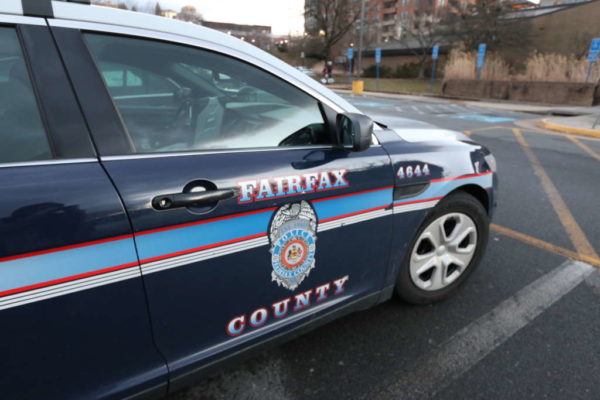
A report showing that Black people are disproportionately involved in use-of-force incidents is prompting familiar calls for reform.
Fairfax NAACP president Sean Perryman is calling on the Fairfax County Board of Supervisors to address the disparity, which has been on the books for six years.
The latest report, released yesterday (Tuesday), shows that Black residents are involved in nearly 46 percent of use-of-force incidents, even though they make up less than 10 percent of the county’s population. The disparity is less prominent in the Reston District Station.
Perryman is also calling on FCPD to release more data on use of force, including why a stop may turn into a use of force case.
“I don’t understand why the county doesn’t have a sense of urgency about providing that data to us,” Perryman said. “My suspicion is that that data will be much worse than the use of force data.”
He added that he is unsurprised by the data he has seen thus far — which is largely consistent with racial disparities throughout the country.
Hunter Mill District Supervisor Walter Alcorn pitched a three-pronged approach to address the issue.
Alcorn told Reston Now that the body-worn camera should be quickly implemented throughout the county. Currently, three district stations, including Reston, use the devices.
“The role of body-worn cameras in reviewing use of force incidents – as partially implemented in Fairfax County – has already proved useful in the Mount Vernon area of Fairfax County earlier this month,” he said.
Alcorn also said that the county needs to “double down” on community policing.
“This is especially important when most of our police officers do not live in the county and do not have many opportunities outside of duty to get to know county residents,” he said.
On a broader level, Alcorn also says that the county needs to shift to another first responder model that does not rely on armed officers or use of force.
“Many of the community needs for which police are currently called do not involve violation of laws. Examples include crisis counseling, suicide prevention, conflict resolution, and a wide range of mental health and behavioral issues. Creating an unarmed first response unit for these and similar community needs would mark a major step beyond the old model,” he said.
Ashley Hopkins contributed reporting to this story

Silver Line Summer Shutdown Town Hall is Today — Providence District Supervisor Dalia Palchik and Hunter Mill District Supervisor Walter Alcorn will hold a town hall today (Thursday) from 6:30-7:30 p.m. via Webex. Representatives from the Washington Metropolitan Area Transit Authority and the Fairfax County Department of Transportation will also attend the virtual meeting. [Webex]
Summer Camps Cancelled — The Fairfax County Park Authority has canceled all of its summer camps due to guidance provided by the Centers for Disease Control and Prevention and local health officials. [FCPA]
Local Junior Collects Cards for Senior Living Home Residents — “South Lakes High junior Mary started a campaign in her community to collect letters and cards for residents in a senior living home. She posted her request on social media and collected the letters in a bin outside on her front porch. Since the residents aren’t permitted visitors, she thought they might appreciate the mail.” [Fairfax County Public Schools]
Next Reston Comprehensive Plan Task Force Meeting Announced — The task force will continue its second virtual meeting on Tuesday, May 26 from 7-9 p.m. Items on the agenda include the history of planning in Reston and elements of comprehensive planning. [Fairfax County Government]
Photo via vantagehill/Flickr
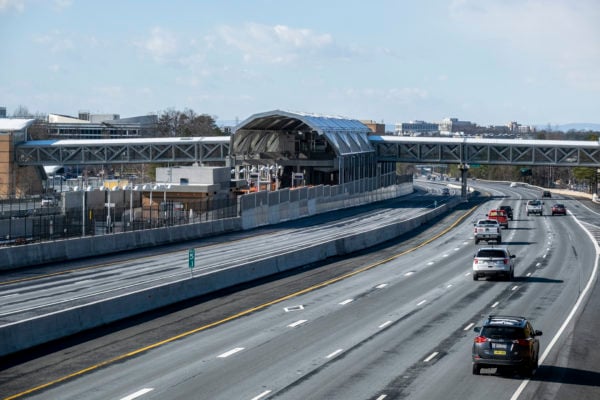
(Updated 5/20/2020) Before Orange and Silver line stations temporarily close this Saturday (May 23), Fairfax County officials for the Tysons and Vienna areas want to know more about the closures’ impact.
Providence District Supervisor Dalia Palchik and Hunter Mill District Supervisor Walter Alcorn plan to hold a virtual town hall on Thursday (May 21), according to staff from Palchik’s office.
The discussion will include representatives from WMATA and the county’s transportation department.
All Orange and Silver line stations west of the Ballston station will be closed through the fall for platform reconstruction at the four Orange Line stations and work to connect the Silver Line with the upcoming stations running from Reston to Ashburn.
The town hall is set to start at 6:30 p.m. People can register online.
Photo by Jay Westcott
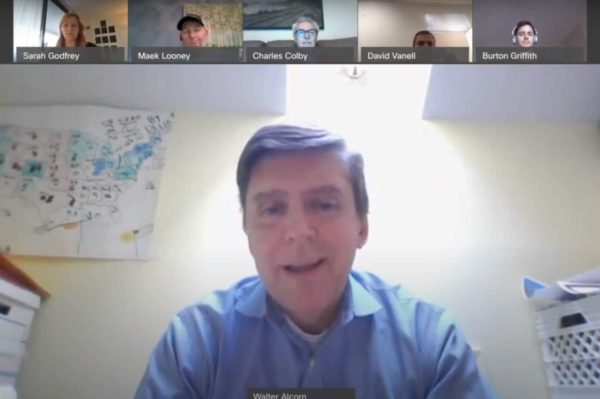
A task force chaired by Hunter Mill District Supervisor Walter Alcorn kicked off a review of Reston’s guiding planning and development document Monday night.
The 24-member group, which includes representatives from community organizations, developers, and real estate professionals, reviewed the primary objectives of the task force, which Alcorn assembled earlier this year. Over the next several months, members will develop recommendations on Reston’s Comprehensive Plan, which has been criticized by residents and others for not being up to date with the current and future pace of development.
Since the plan was last updated in 2014, 39 major zoning applications have been approved and 12 major zoning applications are in process, according to Chris Caperton, deputy director of the county’s planning and development department. More than 14 million square feet of commercial development and 13.4 million square feet of residential development have been approved, according to 2019 data.
Alcorn outlined a review of the following focus areas:
- Projected population thresholds
- Land use in Reston’s village centers
- An evaluation of the plan’s language regarding more affordable housing and the preservation and improvement of existing affordable housing
- Planned pedestrian and bicycle infrastructure to access Metro stations
- If the plan provides adequate guidance on urban scale mobility and development design in Reston’s Transit Station Areas while protecting neighborhood stability of nearby areas
- Transportation improvements and their alignment with planned development
- How the plan can better enhance Reston’s natural environment and encourage energy efficiency
- How the plan address concerns about the “monopolization” of ownership in Reston, especially pertaining to Boston Properties’ ownership of Reston Town Center
- If the historic practice of promoting privately-owned open space addresses public needs for the next 50 years
Alcorn said the task force’s timetable was “aggressive” to complete its work. The next meeting, which will be held online, is slated for May 26.
He also clarified that discussions around the future ownership of Reston Town Center would center around whether or not there is a longterm vision of the ownership of Reston’s commercial center.
The review will not be restricted to Reston’s Planned Residential Community District. A county proposal to increase that district’s population density — among other proposed changes — drew community rancor and was ultimately deferred last year.
Others encouraged the task force to take a close look at whether or not the plan provides sufficient guidance on managing the pace of infrastructure and development in the area.
Reston Association board member John Mooney said he was concerned that county studies have primarily examined the effect of development in Reston’s Transit Station Area (TSA) on traffic specific in that area.
After a series of meetings, the task force will pitch recommendations to the Fairfax County Planning Commission. The Fairfax County Board of Supervisors will then vote on any proposed amendments to the plan.
More information about the task force and upcoming meetings is available online.
During the COVID-19 pandemic, food insecurity has become increasingly common. Community members will have the chance to ease the burden by donating non-perishable goods to an upcoming campaign.
Stuff the Bus, a typically biannual effort, organized collections dates on Saturday (May 16) and Tuesday (May 19) from 10 a.m. until 3 p.m. to help fill the requests of local food banks, according to the event page.
“Unlike past years, the buses will not be parked in grocery store parking lots. Instead, buses will be parked in less-frequented lots,” the page said.
Around Reston, people can find a donation area at Hunter Mill District Supervisor’s Office (1801 Cameron Glen Drive), which will benefit Cornerstones, according to the event page.
In Great Falls, people can stop by the Great Falls Library (9830 Georgetown Pike).
“Because of the extraordinary events taking place due to the COVID-19 pandemic, the demand for food has surged in Fairfax County, so Stuff the Bus is again stepping up to feed hungry people,” the event page said.
Photo by Austin Kehmeier/Unsplash
In response to Fairfax County’s revised budget, Hunter Mill District Supervisor Walter Alcorn stressed that flexibility is key as the county weathers the economic impact of COVID-19.
The upcoming fiscal year 2021 budget, which is expected to be adopted on May 12 and begin on July 1, underwent revisions earlier this spring to address uncertainties stemming from the pandemic.
Though he expressed disappointment that COVID-19 altered the budget, he said he hopes for economic recovery.
“I strongly believe that we will recover and it should be noted that the Board of Supervisors will have the opportunity to make adjustments at our quarterly reviews,” he said. “This budget is by no means a done deal.”
In the future, Alcorn said he expects the budget to be a living document.
“It is also clear that we still don’t know what the final impacts of the virus will be, so we must continue to be flexible and strategic,” he said.
Earlier in April, he expressed displeasure with the revised budget draft. Now, Alcorn’s latest statement includes many of his previous concerns over a lack of support for local business owners.
“Going forward, I anticipate additional funds being used to help small businesses and others offset the impact of the pandemic on the most vulnerable in our county,” Alcorn said in his statement.
In the statement, Alcorn also reflected on the FY 2020 third-quarter review, saying there is now $200 million in additional funding for the Coronavirus Aid, Relief, and Economic Security (CARES) Act.
The act benefits both families and small businesses, according to the U.S. Department of Treasury.
One of Alcorn’s main concerns was how Latino populations are being hit harder by the virus than other demographics around the county.
“Latinos represent 55% of all COVID-19 cases in Fairfax County even though they represent only 16% of the population,” he said, adding that “in Fairfax County stopping COVID starts with the Latino community.”
To address this, Alcorn suggested the application of the county’s One Fairfax policy, which aims to promote social and racial equity, but did not expand on how One Fairfax would directly be applied.
Photo courtesy Hunter Mill District
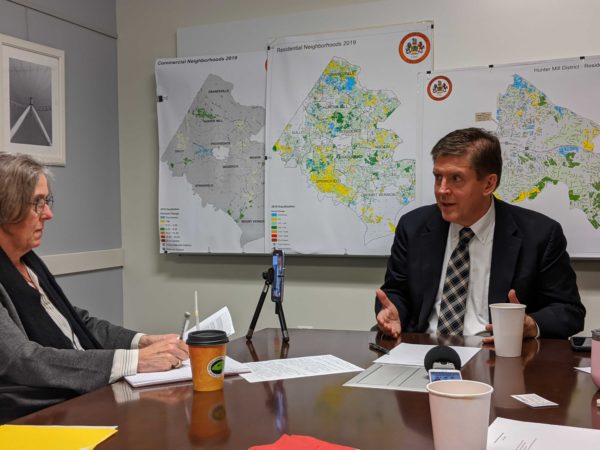
Hunter Mill District Supervisor Walter Alcorn plans to hold another virtual town hall on the proposed budget for the next fiscal year.
The budget town hall, which also took place earlier this month, is set for Friday (April 24) at 12:30 p.m.
In a newsletter, Alcorn stated that the “lunch tie discussion” will also feature Melanie Meren, the school board member for the Hunter Mill District, and Christina Jackson, director of the county’s Department and Budget.
Details on how to participate will be released soon.
The coronavirus pandemic has driven major changes in the proposed budget, including elimination of tax rate increases. The budget assumes that no net increase in the county’s revenues is expected.
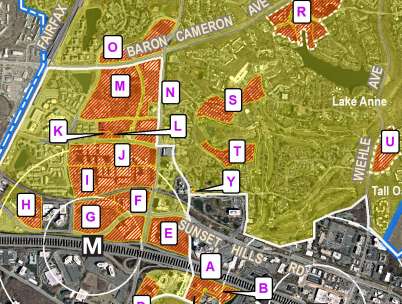
Work on updating the Reston Comprehensive Plan is underway as the inaugural meeting of a planning task force kicks off next month.
The Reston Comprehensive Plan Task Force, which includes residents, business and industry professionals, and other individuals, will meet virtually on May 11.
Taskforce members are expected to be announced later this work, according to Hunter Mill District Supervisor Walter Alcorn’s office.
“There is a lot of work to be done so we will schedule meetings every two weeks,” according to Alcorn’s most recent newsletter.
In his first board matter in January, Alcorn initiated the public participation process to begin mulling changes to the plan, which was last updated five years ago.
Alcorn has stated that updates to the plan will need to consider the most appropriate balance between current and future development, infrastructure, and the environment.
Since the plan was last adopted, more than 30 rezoning applications have been approved by the county, including major placemaking applications in Reston transit-oriented areas.
The review and public engagement process is expected to take up to 18 months.
The plan, which guides the pace and nature of development was first adopted in July 1962 and updated periodically since then.
Handout via Fairfax County Government

Hunter Mill District Supervisor Walter Alcorn will kick off his first town hall next week in Reston.
Alcorn, who pledged to host several community engagement meetings in this term, plans to discuss his priorities for the district at the Feb. 3 meeting. It is set to take place from 7-9 p.m. at Reston Community Center Lake Anne’s Jo Ann Rose Galley (1609-A Washington Plaza-N).
His presentation will be followed by a question-and-answer session with attendees. Residents are encouraged to RSVP by emailing [email protected] with the subject “Feb. 3 town hall.”
The next town hall is planned for Feb. 24. A time and location has not been announced yet.
In his first board matter earlier this month, Alcorn moved to kickstart a 12-to-18 month period to review Reston’s Comprehensive Plan.
Staff photo by Ashley Hopko

Walter Alcorn, the incoming Hunter Mill District Supervisor who won a five-way Democratic primary, plans to prioritize managing growth and infrastructure as he takes over for retiring Cathy Hudgins on Jan. 1.
As cranes scrape the skies and community consternation about development continues to rumble, one of Alcorn’s top priorities is to update and improve Reston’s major planning document — phase two of Reston’s comprehensive plan.
“Our biggest challenge is clearly managing the growth that we’re undergoing right now, both in terms of mobility and change and our quality of life,” Alcorn said in a recent interview with Reston Now.
He hopes to incorporate measures that manage growth and infrastructure — including population projections that can guide infrastructure needs, planning for public facilities like transportation and schools, and expectations for public open space. Alcorn also hopes to incorporate language to preserve existing affordable housing and clarify expectations surround the future redevelopment of Reston’s village centers, some of which are in need of revitalization.
Although Alcorn has not pitched specific recommendations — a public feedback process in early 2020 will guide the community conversation — the Democrat has one specific idea: breaking up the ownership of Reston Town Center.
Alcorn says the county can incorporate language in the comprehensive plan to “call for diverse ownership of Reston Town Center” in order to break up the “monopolistic” ownership of Reston’s core from Boston Properties. The move would address concerns related to vacancies and the departure of small businesses following the company’s seismic shift to paid parking in 2017.
For now, the controversial discussion on increasing Reston’s population density per acre in the Planned Residential Community district — the community’s primary zoning district has been indefinitely delayed.
Alcorn believes the county should reexamine Reston’s comprehensive plan before reconvening discussions on the tabled PRC proposal.
“We need to fix the comprehensive plan,” Alcorn told Reston Now. “My first priority is to fix the comprehensive plan.”
He also wants to explore ways to streamline how Reston-related development proposals are reviewed, particularly between the Hunter Mill District Land Use Committee, which advises the supervisor’s office on land use issues, and the Reston Planning & Zoning Committee. Possible proposals include improving the public input process, adding county staff support to attend meetings and improving the sequencing of the multi-step approval process.
“Many times, these groups are asked to make recommendations on zoning before they can even see proffers associate with rezoning,” he said.
Other county-wide initiatives Alcorn hopes to take a lead on include:
- A land use reform initiative to create affordable housing opportunities, in conjunction with other supervisors
- Efforts to improve pedestrian mobility through regional initiates and more comprehensive planning beyond the county’s bicycle master plan.
As he begins his term on Jan. 1, Alcorn hopes to leverage his experience as a former planner with the county to ensure the vitality and promise of Reston remains.
“I come to this job with good knowledge of the land use process and also a commitment to engage the public and the community in that land use process,” he says. “We’re at an interesting time in Reston with transit-oriented development underway and older communities that are in need of retention. That is something that is new.”
Photo via Facebook


